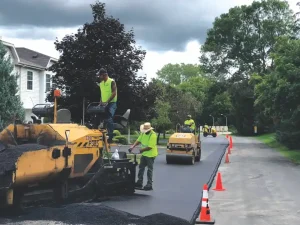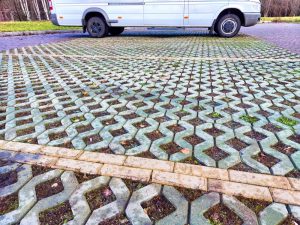Cold weather is just around the corner for parts of the northeast. Pro-Pave Inc. proudly serves the Washington D.C., Maryland, Virginia and West Virginia areas. It’s no surprise that these areas receive their fair share of cold weather in the winter months. Business owners may worry about how this impending cold weather will affect their concrete surfaces. Pro-Pave is sharing a few tidbits about how cold weather affects concrete and the steps necessary to protect your businesses’ concrete surfaces. Read more below!
Most people assume the best time to pour concrete is on a warm and sunny day, but that couldn’t be farther from the truth. The best time to pour concrete is actually on an overcast and slightly humid day. The ideal temperature to pour concrete is mid-50s to lower 60s. That’s because if the concrete mixture is too hot, then water can evaporate from the concrete quickly. If it’s too cold, then the concrete can freeze, which prevents it from hardening at the rate it’s supposed to, leading to problems.
When it comes to pouring concrete, northeasterners need to be careful that the temperature isn’t too cold outside. Concrete transforms from a semi-liquid to a solid material through a chemical reaction. When it’s too cold outside, that chemical reaction slows down, which isn’t good for the final outcome. There are steps that can be taken if concrete must be poured in the colder months. For example, a newly excavated area can be covered with insulated blankets to preserve the natural warmth of the soil.
After your concrete is poured and the cooler weather is just around the corner, how can business owners maintain their concrete surfaces to ensure they will be safe? Here are a few helpful tips we recommend:
- Patch or Repair Damage: It’s very important to patch or repair any cracks or damage in the concrete before the cold weather arrives. If you notice any cracks or damage on the surface, then patching or repairing the area before cold weather arrives can ensure the damage will not spread to other areas. Cracks can be filled with a sealant to bond the surface together again.
- Seal the Area: In particularly colder climates, business owners can actually seal their concrete surfaces to prevent damage caused by ice or snow. Sealing a concrete surface helps to ensure that moisture from snow and ice will not seep into the concrete, causing damage.
- Don’t Salt the Concrete: This may seem counterintuitive to what we believe in the Northeast, but salting concrete surfaces actually attracts moisture. A safer alternative is to actually use sand or gravel to cover your concrete surfaces during ice and snow.
Work With Pro-Pave, Inc.
Pro-Pave, Inc. has established a reputation as one of the Washington, DC area’s most reliable paving companies. Since 2001, Pro-Pave has provided asphalt paving, concrete paving, and property maintenance services to various customers, including churches, colleges and universities, retailers, HOAs, and more.
We are always up to date on the latest news in paving. To find out more about how we can help you, contact Pro-Pave today. Visit our website, or give us a call at (703) 433-9500.





